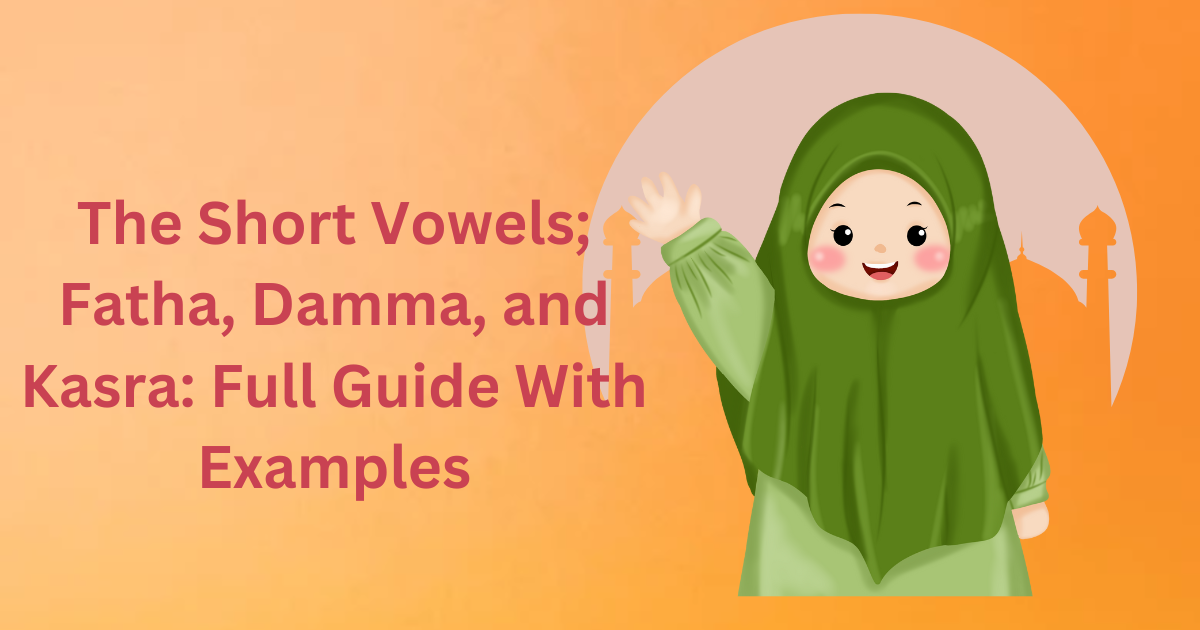In Arabic, the short vowels; Fatha, Damma, and Kasra, are essential for precise pronunciation and meaning. The Fatha (ـَ), is a line above the letter, gives the /a/ sound, as in “بَيت” (house). The Damma (ـُ), is a small circle above, provides the /u/ sound, seen in “مُحمد” (Muhammad). The Kasra (ـِ), is a line below, represents the /i/ sound, like in “وِسادة” (pillow). Mastering these marks ensures clear communication and accurate reading, especially in the Qur’an, transforming your grasp of Arabic into a harmonious and meaningful experience.
Table of Contents
Introduction to Understand Short Vowels:
Unquestionably, the Arabic language is really distinguished with its prominent, matchless features, that you can find integrating together to create a whole, perfect linguistic power of expression. Among those unique, Arabic-features , the diacritical marks (or we can say the short vowels, from now on) are so crucial and irreplaceable for the right pronunciation of the words; not only that, but also the slightest mix-up in the short vowels can change the whole meaning, on both levels: the term-level, and that of the context, too.
What Are the Short Vowels; Fatha, Damma, and Kasra, in Arabic?
The short vowels in Arabic, also known as “Tashkeel”, are small symbols, or marks written above or below the letter, indicating its vocal-movement when pronounced. They lead you to pronounce, and comprehend the Arabic words right, with no mixing-up.
What are Fatha, Damma, And Kasra?
Short vowels in Arabic are diacritical marks that indicate vowel sounds and affect the pronunciation of words. Fatha, Damma, and Kasra are essential short vowels in Arabic.
The Fatha (ـَ) indicates an open mouth position and is pronounced as /a/, as in “بَيت” (house). Meanwhile, the Damma (ـُ) involves a rounded mouth position and is pronounced as /u/, as in “مُحمد” (Muhammad). As for the Kasra (ـِ), it requires a lowered mouth position and is pronounced as /i/, as in “وِسادة” (pillow).
Each vowel mark modifies the pronunciation and meaning of Arabic words.
They include Fatha (ـَ), Damma (ـُ), and Kasra (ـِ), as follows:
| Fatha (أَ) | Damma (أُ) | Kasra (أِ) |
| It Refers to the open mouth-position, when pronouncing the short vowel /a/. It is the mark of the short horizontal line (ـَ) above the Arabic letter. Its long vowel is /aa/, which is the Arabic letter “ا”. Like: بَيت /Bait/ (home). رَجل / rajul/ (man). وَلَد /Walad/ (boy). فَتاه /fatah/ (girl). | It Refers to the small circle-like, mouth-position, when pronouncing the short vowel /u/. It is the mark of the small apostrophe-like shape (ـُ),above the Arabic letter. Its long vowel is /oo/, which is the Arabic letter “و”. Like: مُحمد/Muhammad/. مُبارك /Mubarak/ (blessed). مُشجع /Mushaji’/ (fan) مُبارة /Mubarah/ (match). | It Refers to the low mouth-position, when pronouncing the short vowel /i/. It is the mark of the short horizontal line (ـِ), looking like the fatha, yet kasra is below the letter. Its long vowel is /ee/, which is the Arabic letter ي””. Like: وِسادة /Wisada/ (pillow). عِبرة /’ibrah/ (lesson) شِفاء /Shifaa/ (healing) كِتاب /Kitab/ (book). |
What Are the Purposes of the Short Vowels in Arabic?
In Arabic, the short vowels are part and parcel of forming the word, and in turn, its meaning, too; The short vowels are necessary to read, write, and understand right the Arabic words; furthermore, they are
1. Key to Pronounce Correctly:
Simply, each Arabic letter is properly pronounced, based on two: its vocal, exist-point (Makhraj), and the airflow-movement of the letter when pronouncing; the short vowels are key to determine this vocal-movement of each letter in the word.
2. Indicator of the Grammatical Function:
The short vowels marks -especially on the last letter of the word- indicate the word-grammatical function, like subject, or object, etc., in the sentence, and its meaningful position in the whole context, too.
3. Distinguishing the Similar Words:
As said, the Arabic language terms are miraculously deep, with numerous meanings. You can find the same word with multiple, different meanings! The short vowels help, for sure, to differentiate between similar words, and also between the noun and verb of the same word, as well as the different tenses.
4. Helping to Enhance the Arabic-Reading, Particularly, at First:
The short vowels properly direct the Arabic-reader’s focus on how to read the words clearly, and harmoniously in the context, and to comprehend their meanings, in turn.
Are the Short Vowels That Critical?
-The short vowels are seriously needed to decide the grammatical function, that, in turn, affects the whole meaning of the sentence:
In Arabic, the doer/ subject is mostly marked by a damma (ـُ) at the last letter, whereas the object is mostly marked by a fatha (ـَ), at the last letter.
Of course, realizing that piece of information about the short vowels will help you understand clearly ‘who’ does ‘what’ to ‘whom’, no matter how overlapping the context may seem!
Now, pay close attention to this ayah:
“إِنَّما يَخْشَى اللَّهَ مِنْ عِبادِهِ الْعُلَماءُ إِنَّ اللَّهَ عَزِيزٌ غَفُورٌ”
[Only those fear Allah, from among His servants, who have knowledge. Indeed, Allah is Exalted in Might and Forgiving.]
Look at the two bold words: اللَّهَ, and الْعُلَماءُ
–Here, there is a fatha (ـَ), at the end of the word اللَّهَ, indicates that Allah is The Feared.
Whereas the damma-mark (ـُ) on the last letter of الْعُلَماءُ indicate the attribute of the doer- as in Arabic, the attribute is marked at the end as same as the attributed. That means that only those servants having knowledge are the ones who truly fear Allah.
How critical are the short vowels, in Arabic!
Imagine if you mix-up the damma, with the fatha in a sentence like that; it will turn its entire meaning upside down! As in that case, the meaning will be totally mistaken; that Allah is The One Who fears His servants who have knowledge!!
Is it reasonable, then, that The Lord, The Almighty, The Creator Who is Above-All is The One fearing His Own servants?!! Definitely, not the right meaning!
Actually, such slight mixing-up of the short vowels leads not only to a grave-misunderstanding, but also to a disbelief of Allah, in context like that!
How to Master Fatha, Damma, And Kasra When Reading the Quran?
Considering the indispensable significance of the short vowels in Arabic, learning them becomes a basic step to be taken by everyone seeking to read the Holy Quran correctly, and in turn, understanding it clearly. Here are some tips and tricks for achieving that high aim:
1. Watch Online Arabic Videos:
Start watching online Arabic videos about fatha, damma, kasra, as short vowels in Arabic: their importance, usage, shapes, and so on.
2. Install Arabic-Learning Program:
Install Arabic-letters, engaging app, to listen to each letter pronounced particularly with the short vowels, along with the clarifying flashcards or diagrams of the mouth positions when pronouncing.
3. Start Practicing, Yourself:
Practice all the Arabic alphabet, one by one, pronouncing each letter with each short vowel, whether fatha, damma, kasra.
4. Seek Being Educated Right:
Seek the help of a qualified Arabic-teacher , or a trusted Arabic-learning academy to help teaching, and correcting your pronunciation, and learning of the short vowels.
5. Keep Listening to Right Recitations of the Quran:
Be consistent and attentive to the right Arabic-pronunciation from natives, with the short vowels applied properly, and the best practice ever is to listen to the correct Quran-recitations by the well-versed Sheikhs, and keep repeating after them, for each ayah.
6. More, and More of Reciting the Quran on Your Own:
Your own constant recitation of the Quran will upgrade your skill of reading it more familiarly, smoothly, and fluently, and of course, along with tracking your progress.
7. Be Attentive to the Short Vowels, While Reading the Quran:
Paying attention to the short vowels while reading the Quran will make you get mindful, and used to recite it correctly, preserving its words, and true meanings.
Learn Arabic Online With Bayan al-Quran Native Arab Tutors:
Embark on a transformative journey of Arabic learning with Bayan Al-Quran’s comprehensive online Arabic courses. Our platform offers an authentic and immersive experience tailored to learners worldwide. Whether you’re a beginner or seeking to enhance your skills, our Tajweed courses provide expert guidance and structured learning to master Arabic learning.
🎓 Expert Guidance:
Benefit from experienced instructors who specialize in Arabic, breaking down complex rules into manageable segments for learners of all levels.
✨ Key Features:
- Structured, step-by-step learning approach.
- Access to high-quality instructional materials.
- Real-time feedback from qualified tutors to enhance your practice.
- Flexible learning schedules to accommodate your pace and convenience.
- Immerse yourself in the melodious tones of Quranic recitation, enriching your spiritual experience.
🌟 Why Choose Bayan Al-Quran?
Join our vibrant community dedicated to perfecting Arabic learning. Choose Bayan Al-Quran for a transformative learning experience and embark on a path to mastering Arabic with confidence.
Learn with Bayan al-Quran with Native Arab tutors. There are also several courses that can help you in this regard.
Conclusion:
Short vowels in Arabic, known as Tashkeel, are crucial for correct pronunciation and meaning. Fatha (ـَ) is a horizontal line above a letter, representing the vowel /a/, as seen in “بَيت” (house). Damma (ـُ) is a small circle above a letter, indicating the vowel /u/, as in “مُحمد” (Muhammad). Kasra (ـِ) is a horizontal line below a letter, denoting the vowel /i/, like in “وِسادة” (pillow). These marks guide pronunciation, affect grammatical functions, and differentiate meanings.
Mastering these short vowels is essential for accurate Arabic reading and comprehension, especially in contexts like the Quran. They ensure proper pronunciation and understanding of words, avoiding misinterpretations. To master them, practice using online resources, learning apps, and guidance from qualified teachers, while consistently listening to and reciting Quranic verses.
Learning the Arabic short vowels can’t be considered as an ‘extra’ step, no; rather, it is one of the basic steps of learning that profound, subtle language. Mastering the short vowels will speed up your right understanding, and mastering the Arabic language, without a doubt!

















